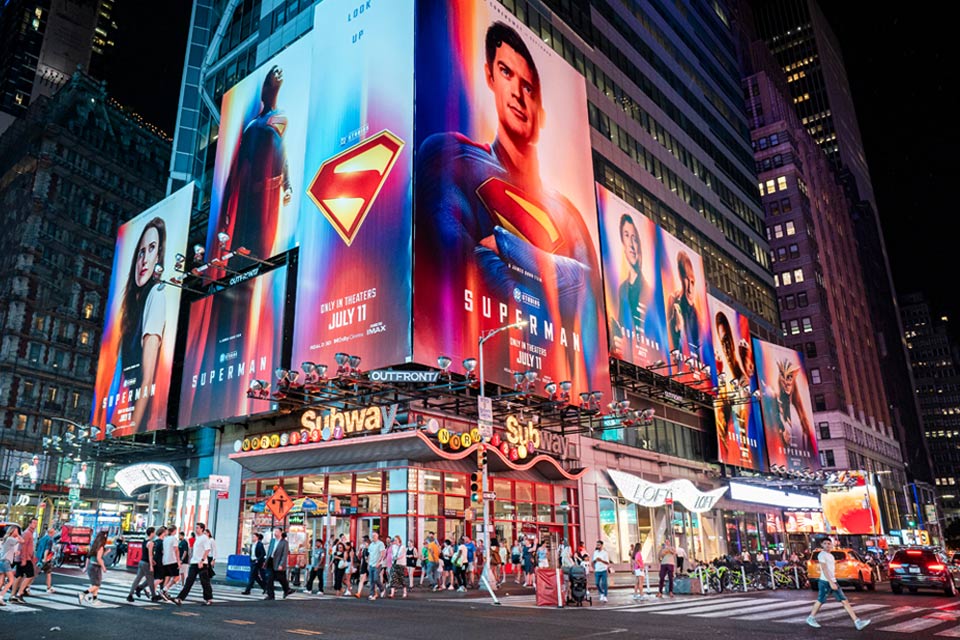Familiar heroes, new spins: film historian Thomas Doherty on a summer of reboots

Photo Credit: Craig T Fruchtman/Getty Images
By Julian Cardillo ’14
July 28, 2025
The latest film iteration of the Fantastic Four — based on the decades-long Marvel comic book series of the same name — entered theaters July 24, joining “Superman” and “Jurassic World Rebirth” in a summer blockbuster season defined by reboots.
American studies professor Thomas Doherty, a cultural historian and film expert, explained why these fantasy mega spectacles persist — and what their ongoing popularity says about the moviegoing public.
What stands out to you about this summer’s wave of reboots?
These are all properties with long histories, yet studios keep bringing them back. I think the obvious explanation is that these are IP films. These films skew younger, and the studios know they’re working with characters that have a built-in audience. They’re designed to travel well — not just here, but globally. They tend to be effects-driven and narrative-light. Something like “Jurassic Park” doesn’t require you to know much: Dinosaurs eat people.
You don’t need a cultural or historical frame of reference.
In contrast, I recently saw a beautifully restored version of “Sunset Boulevard.” That’s a film deeply tied to language, culture and context — you need to understand 1950s Hollywood and appreciate sharp dialogue to fully get it. You can’t do “Sunset Boulevard 2.” It’s non-repeatable.
What challenges do filmmakers face when rebooting a movie like “Superman” or “Fantastic Four?”
It’s a real challenge, but also a familiar one. This kind of thing goes all the way back to the 1930s, when the Western was Hollywood’s dominant genre. Studios churned out hundreds of them, from quick, low-budget “horse operas” to big, ambitious films that could be quite sophisticated.
What made those Westerns work — and what keeps today’s superhero films going — is the genre format itself. It gives you a set of expectations: the costumes, the conflict, the arc. But you can’t just repeat the same story beat for beat. The creative challenge is to find a variation that feels fresh — enough of a twist to make it feel like something new, even within the familiar framework.
It’s the classic genre challenge: How do you make something fresh within a strict formula? The best filmmakers find originality within those constraints. Christopher Nolan’s “Dark Knight” trilogy is a great example — quotable lines, psychological depth, and genuinely memorable characters.
Why are characters like Superman and Spider-Man still around after so many decades?
These are enduring archetypes. Superman goes back to the 1930s, Fantastic Four to the 1960s. There’s a reason we also keep remaking films — these stories are built on deep, recognizable structures. In the 1960s, Marvel gave superheroes psychological depth. Spider-Man, for instance, is a regular kid with superpowers but still struggles with girls and high school. That mix of identifiability and fantasy has real staying power — especially in an era when we increasingly live through screens and digital projections.
Do you think there are moments when the moviegoing public as a whole experiences a kind of shift — like a turning point in how we watch or what we expect from films?
Yes, absolutely — and I think that happens on both a personal and a cultural level. Sometimes there’s a film that, for a generation, resets the whole bar. For me, it was “Bonnie and Clyde” and “The Graduate,” both in 1967. I remember going in as a teenager, probably thinking I was just seeing another movie — and then realizing, even as a kid, that these were different. The style, the themes, the whole atmosphere. It was a moment where you start to recognize that film can be art, not just entertainment.
I see the same thing happen with my students. A few weeks into the semester, they start watching movies with a different level of attention. Suddenly they’re noticing cinematography, structure, how music is used, how a shot is composed. It’s exciting to witness.
On a broader cultural scale, there are those turning points too. Take a film like Stanley Kubrick’s “2001: A Space Odyssey,” which showed that science fiction could explore profound themes, not just entertain. That was a turning point — the genre grew up. So yes, those shifts happen — individually and collectively. And they keep happening.


